The shocking truth behind Eazy-E’s untimely death has resurfaced, reigniting a firestorm of speculation, suspicion, and conspiracy theories nearly thirty years after the legendary rapper died from AIDS at just 30 years old. On March 26, 1995, the world lost Eric “Eazy-E” Wright — a founding father of gangsta rap — only ten days after publicly revealing his diagnosis, a timeline so abrupt and unsettling that it continues to haunt the hip-hop community.

Eazy-E, widely credited with shaping the sound and attitude of West Coast rap, entered the hospital believing he was suffering from asthma complications. Instead, doctors delivered a shocking diagnosis: advanced-stage AIDS, with pneumonia listed as the immediate cause of death. But what raised eyebrows — then and now — was the speed of his decline. HIV typically takes years to progress into AIDS, yet Eazy-E’s health deteriorated in a matter of days, not months or years.
His death sent shockwaves through fans and artists alike, abruptly confronting the hip-hop world with a topic often avoided at the time: HIV/AIDS. Just days before his passing, Eazy-E appeared in a heartbreaking press conference, urging others to take HIV seriously. His message resonated deeply — and tragically — marking one of the first times the rap community was forced to face its own vulnerability.
But in the years since, the circumstances surrounding Eazy-E’s death have become fertile ground for suspicion.

Longstanding rivalries, especially with figures like Suge Knight, have fed theories that Eazy-E’s death may not have been natural. In one infamous televised moment, Knight joked about deliberately infecting someone with HIV using a tainted needle — a comment that sent conspiracy theories into overdrive. While many dismiss these theories as sensational speculation, the violent backdrop of 1990s rap culture and the high-stakes business dealings surrounding Ruthless Records continue to cloud the narrative.
Adding fuel to the fire, Eazy-E’s estate became mired in bitter legal disputes following his death. His widow, Tomica Woods-Wright, assumed control of Ruthless Records, but accusations of manipulation and exclusion quickly followed. Some family members claimed they were cut out of inheritance deliberations, giving rise to theories that financial motives may have played a role in the chaos surrounding his final days.

Despite the controversy, medical experts have consistently stood by the official cause of death, noting that rapid progression from HIV to AIDS — while rare — is medically possible. HIV can remain undetected for years, only for symptoms to escalate with staggering speed once the immune system begins to collapse.
As the anniversary of Eazy-E’s passing approaches, the unresolved questions surrounding his death continue to echo through the hip-hop community. Social media has amplified old theories, while documentaries and interviews have revived public fascination with the case. The contradictions, the coincidences, the rivalries





